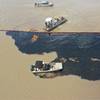BIMCO Launches Solid Cargo Database
Guidance as to what occupational hazards may be posed to personnel handling the cargo, for instance as posed by alumina dust which is not only extremely abrasive but can also be toxic if inhaled; The type of packaging normally used for the shipment of the cargo (bulk and/or bags, barrels, etc.) and the applicable IMO requirements depending upon the type of packaging chosen; Emergency response section providing guidance on safety procedures in the event of fire or the spillage of the cargo; and Information on the origin of the cargo. Additional features “Also included under each cargo entry is a section on the synonyms or trade names commonly used for the cargo”, Niels Bjørn Mortensen explained. He went on to say, “An easy to use and efficient search facility which enables users to access the information needed quickly is provided as well. Users can find a cargo by typing in its synonym. The official name will then appear. For instance, by typing in ‘petcoke’, an entry for ‘petroleum coke’ will appear. Or should one be asked to carry barium sulphate and wish to know whether it has to comply with any of the codes, for example, ‘barium sulphate’ can simply be typed in to the search function and the cargo entry for ‘barytes’ will appear which, in turn, is subject to the requirements of the BC Code.” “In addition, users are able to search for a cargo, or similar cargoes in the group by simply typing a generic name (i.e. ‘coke’). A list of different entries will quickly appear (for this example, coke, coke breeze and petroleum coke)”. Niels Bjørn Mortensen said.
BIMCO Reporting Forms Included in the Cargo Database are easy to use BIMCO Reporting Forms which significantly assist BIMCO’s efforts to improve the situation for vessels in ports around the world. The reporting forms collect data on new or unusual cargo properties and the appropriate cargo handling procedures required such as cleaning, undue delays, inspection, loading, carriage instructions, unloading and cleaning, etc. as experienced by the ship and her crew. BIMCO Reporting Forms, which have been used extensively for several years, can easily be adapted into an existing Safety Management System (SMS), as required under the International Safety Management (ISM) regime. The detailed information gathered in the forms is used to produce databases and statistics for use by BIMCO members and in negotiations with various authorities.









